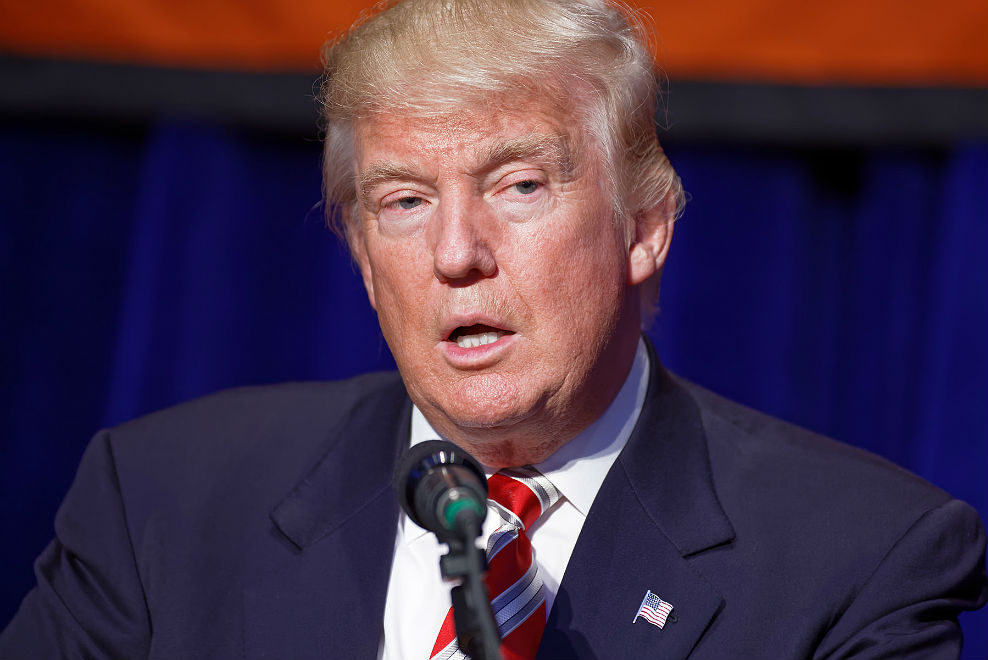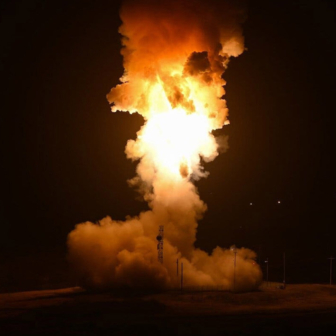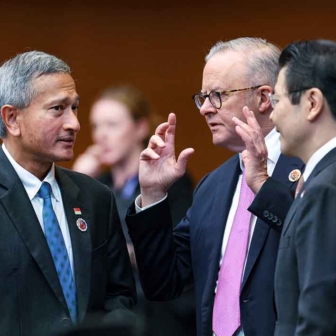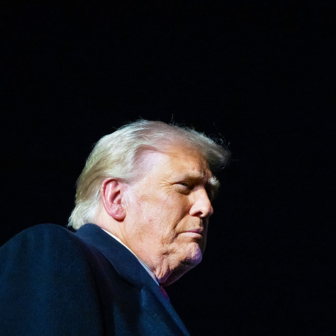Donald Trump’s phone conversation with Taiwan leader Tsai Ing-wen shortly after the US presidential election ruffled feathers in Beijing, and his occasional policy tweets about China since then, touching on tariffs, currency manipulation, and actions in the South China Sea, have aroused further concern. Still, ask leading cadres in Beijing what they think of Trump’s election and they can barely conceal their glee.
The election of a wealthy media celebrity on the promise of making America great again confirms Beijing’s view that the United States is in terminal decline. And if, as promised, Trump abandons the alliance system and the liberal order that Washington has maintained through decades of investment in diplomacy and regional security in the Asia-Pacific, then it’s game over for Pax Americana and win-win-win for China.
As far as Beijing is concerned, Trump can breach protocols on the status of Taiwan, throw up trade walls, call out currency manipulators, and do any number of deals intended to make life difficult for Beijing, but so long as his transactional approach to world affairs undermines the rules-based order and throws alliance partners into a spin, it’s a welcome trade-off. The Chinese leadership is confident that if it comes down to a knuckles-bared fistfight over trade, territory and regional influence, China will win in a knock-out.
Unless Canberra moves adroitly, Australia could be knocked out too. Moving adroitly doesn’t mean siding with Beijing in any dispute with Washington, as some have suggested. Rather, it means calling out China as readily as we do the US when its behaviour threatens the values and principles that underpin our security and wellbeing as a nation.
China’s leaders have long complained that the principles, rules and alliance networks associated with the postwar order – an order imposed by the US – limit their country’s room to manoeuvre. Today, they argue, Washington’s writ should no longer apply in Asia. In a recent policy statement on Asia-Pacific security, Chinese authorities declared that “ and regional rules should be discussed, formulated and observed by all countries concerned, rather than being dictated by any particular country. Rules of individual countries should not automatically become ‘ rules.’”
China is not the only state constrained by “ rules.” All states in the Asia-Pacific region are effectively constricted by a regional security regime designed after the war to inhibit arbitrary or aggressive behaviour by one state towards another. Japan’s margin for movement, for instance, is far narrower than China’s. Until recently, Japanese nationalists have been kept on a tight rein by a postwar constitution, drafted under the supervision of American occupation forces, instituting a liberal-democratic form of government and formally renouncing the sovereign right to wage war. Following China’s aggressive posturing, however, Japan’s prime minister Shinzo Abe has hinted that the restrictions imposed by the postwar order no longer apply to his country either. In anticipation of a visit to Hawaii in December 2016, he is reported to have told colleagues that “if I go to Pearl Harbor, the ‘postwar era’ will come to a complete end for Japan and the United States.” If China takes off the gloves, it can expect other states to do the same.
China’s chaffing at its place in the postwar order differs from Japan’s chiefly in its lack of any tangible foundation. Beijing alleges from time to time that America’s alliance network is an existential threat to China, that open global markets primarily serve American interests, that concern for human rights is merely an excuse for meddling in domestic affairs, that currency movements are manipulated by devious American markets, and that the freedoms enjoyed by the liberal media and academy in the West mask underlying anti-Chinese sentiment. All these claims are contestable. What cannot be denied is that China has adopted its own Leninist party-state constitution, that it does as it pleases around the globe, and that it points its nuclear-tipped missiles towards every point on the compass. Nobody is stopping it from doing so.
Americans also point out that China has been the primary beneficiary of the regional stability underpinned by US security guarantees. American journalist John Pomfret, author of a major recent study on US–China relations, The Beautiful Country and the Middle Kingdom,notes that, apart from a short spell during the cold war, “the United States has been, if anything, the prime foreign enabler of China’s rise. America’s open wallets, open society and open universities have been key factors in China’s ascent from a Third World backwater to a global economic power.” Early American generosity built China’s finest hospitals and universities, American power ended Japan’s horrific occupation of China, American diplomacy secured the region in the postwar era, and America’s commitment to open trade underpinned China’s rapid economic development.From an American perspective, China’s Communist Party would sooner undermine the path that carried China to prosperity than acknowledge that China’s accomplishments were not the Party’s alone.
Australians may not care one way or the other about Chinese revanchists or aggrieved Americans. If they pointed to evidence of American hypocrisy in violating the rules and principles the US lays down for others, they would not be alone. Still, it’s worth asking what the end of a liberal rules-based system, however imperfect, could mean for Australia.
China’s alternative to Pax Americana is not the absence of order, but a new kind of order, one grounded in values that are not universal and rules that are anything but liberal. Unlike America, China will never be accused of hypocrisy: it has no intention of breaching the hierarchical authoritarian principles that underpin the Communist party-state. The Chinese Communist Party is already using local media and other avenues to extend these values into Australia and other countries in violation of the universal rights and values championed by countries working in the liberal tradition.
Put simply, China’s government promotes obedience to authority ahead of freedom, champions hierarchy over equality, and demands submission of individual and community interests to those of an authoritarian state. It could be argued that some of these priorities have merit in the abstract, but there is nothing abstract about them when the authority to be obeyed is the Communist Party of China.
Christopher Ford of the Hudson Institute has spelled out what extending Chinese Communist Party values under a new regional order could mean for states in the region. Beijing aspires to refashion the regional political order after its own hierarchical, authoritarian and deferential style of government. The new order it envisages would see political authority operating “along a vertical axis of hierarchical deference to a lead actor, rather than along a horizontal axis of pluralist interaction.” All states falling under the shadow of this new order would need to accept their place within a framework of authority centred in Beijing, and abide by norms and rules set in Beijing. What this would mean for business and civil society abroad is unclear but, as a mark of deference, governments in the region would be expected to eschew conduct or commentary that might possibly offend the government or people of China. Under Chinese rules, respect for particular national values cannot be separated from ritual displays of respect for the regime in Beijing that sets and polices them.
An idea of how this might work in practice can be gauged from China’s territorial expansion in the South China Sea and the historical arguments mounted on its behalf. Chinese officials frequently point out to Australian business leaders and diplomats that Australia has no skin in the game and hence no business inserting itself in the process of claims settlement in the South China Sea. Nothing could be further from the truth. Australia’s future security and territorial sovereignty require concerted defence of the principles underpinning the existing rules-based system for resolving disputes over land and maritime sovereignty in the region.
Beijing’s maritime claims are based not on commonly understood general rules governing maritime sovereignty but on historical claims unique to China – on Chinese rules, as it were. If Beijing were truly committed to norms, it would have defended its position on maritime sovereignty by contesting specific findings of the arbitral tribunal’s decision on the Philippines’ South China Sea case in July 2016 while respecting its overall jurisdiction in the case. Instead, Beijing chose to ignore the tribunal’s jurisdiction. Its claims to disputed maritime territories are based not on commonly accepted rules and norms, but on particular historical claims to seas and territories over which no tribunal outside China is permitted to exercise jurisdiction.
In laying claim to disputed territories, Beijing reaches back centuries to establish historical ownership over land and maritime territories that can then be forcefully “reclaimed” as its own. A country can never invade itself, and so China’s leaders believe that by claiming to be recovering “lost” territories they can never be accused of invading anyone.
Beijing’s elliptical style of historical thinking seems to inform the judgement of retired state and federal political leaders in Australia who insist, from time to time, that China is a peace-loving nation that never has and never will extend its authority by force. Former prime minister Malcolm Fraser presented this argument most starkly in his book Dangerous Allies (2014).The claim fails to explain how China grew from a modest state in the lower reaches of the Yellow and Yangtze Rivers into a vast continental power stretching from the deserts of central Asia to the peaks of the Himalayas, and north to Siberia, without apparently conquering the territories it incorporated. The propensity of Australian leaders to repeat China’s claims can be explained by reference to classical Chinese military strategy, most clearly set out in Sun Zi’s Art of War, in which artful deception of the leaders of rival states is a key tactic in any successful conquest.
When this kind of history rules, anything goes. What kinds of historical claims could Australia find itself open to if it were to concede China’s historical claims to the South China Sea? In the absence of contestable principles of governance, could China claim Australian territory without, in its own terms, “invading” Australia?
On 25 November 2016, the Chinese naval training vessel Zheng He, named after a famous fifteenth-century Chinese admiral, docked in Sydney Harbour. According to the local Chinese-language press, China’s consul-general, Gu Xiaojie, welcomed the vessel in Chinese with these words:
The Chinese nation is a peace-loving nation. Adhering to the road of peaceful development is the serious choice and solemn commitment of the government and people of China. Six centuries ago Zheng He’s fleet, vast as it was, did not occupy an inch of territory belonging to other governments. Today the development of China’s naval forces has one aim only, to preserve peace, and is not aiming at expansion or regional hegemony. The Zheng He comes in peace and is certain to return home laden with friendship.
The consul-general’s claims bear little relation to history. It is not true to say that China has never expanded by force or occupied territory belonging to other states. Nor were Admiral Zheng He’s voyages peaceful argosies. History aside, at this moment the People’s Navy is advancing China’s territorial expansion at the expense of the Philippines, Vietnam and other neighbouring states. While spinning stories of historical ownership and peaceful intent, China is seizing territory and building military bases in the South China Sea from which it can project hard power into adjacent territories, including US bases in the region and ultimately Australian territorial waters. It has done so peacefully only in the sense that it has advanced in incremental steps, as Ross Babbage has put it, “below the threshold that would trigger a forceful Western response.”
So it has always been. China has historically expanded through incremental conquest and periodically contracted after defeats. Sometimes the conquests have involved Chinese forces invading neighbouring territories and folding them into China, as with Yunnan and Tibet in the south. At other times, neighbouring forces have invaded China and brought their conquered territories with them. When the Manchus conquered China in 1644, they brought the vast lands of Manchuria into China where they became known as the Northeastern Provinces. In the 1750s, China invaded the immense territories to the west, incorporating those into the country as Xinjiang.
These were not peaceful conquests. In the western conquests of the 1750s, for example, the Qing emperor ordered the massacre of the dominant Dzungar Mongol community in what is known as the Dzungar Genocide. An estimated 500,000 Dzungar Mongols were killed and the remainder were taken into slavery. The history is little known because once Xinjiang was incorporated into China the Dzungar were no longer around to recount their own genocide.
Three centuries earlier, at the time of Zheng He’s voyages, the Ming emperor was mounting massive invasions into continental Southeast Asia and across the northeastern reaches of the lower Himalayas. Part of the invaded territory was incorporated into China as Yunnan Province. Another part fell within what we know as Vietnam; it was subsequently wrested back by locals and is now considered Vietnamese territory. Zheng He’s voyages were historically associated with these fifteenth-century Ming conquests.
There was little that was peaceful about Zheng He’s own ascent to the position of admiral. He was a Muslim of Persian descent whose family is thought to have been associated with the Mongol rulers of China before the founders of the Ming Dynasty drove them out. As a boy, he was captured and castrated by Chinese forces during the Ming invasions of Yunnan. He ascended the Ming military hierarchy through association with an able member of the Ming imperial family, Zhu Di, who seized power in a military coup from his nephew, the reigning emperor, before executing thousands of the nephew’s loyal followers.
Zheng He’s fabled naval expeditions were not especially peaceful either. His well-armed troops engaged in fighting and kidnapping en route and set up maritime defence posts on far-flung alien territories. His fleets established military bases in Malacca and Samudera to control maritime passage through the Straits of Malacca. At one point they returned to China with the captured ruler of a Sri Lankan kingdom.
In a rules-based order, these troubled histories and the disputes they generate would be of interest to few but historians. But in a regional order based on contested national stories, China’s claims to historical precedents begin to matter at the highest levels of government.
In a formal presentation to the joint houses of the Australian parliament on 24 October 2003, China’s president, Hu Jintao, laid the foundations for the recent visit by the training ship Zheng He when he told parliament:
Back in the 1420s, the expeditionary fleets of China’s Ming Dynasty reached Australian shores. For centuries, the Chinese sailed across vast seas and settled down in what they called Southern Land, or today’s Australia. They brought Chinese culture to this land and lived harmoniously with the local people, contributing their proud share to Australia’s economy, society and its thriving pluralistic culture.
At the time President Hu was speaking, China was still largely playing by the rules. His reference to Zheng He’s fabled expeditionary fleets reaching Australian shores raised a few eyebrows among historians, but his remarks were allowed to pass in the belief that they were merely ceremonial. Can we now be so sure?
If we concede that China’s primary test of maritime sovereignty is a historical claim to seas once traversed by its own fleets, then it would be prudent to ask whether President Hu’s speech to the Australian parliament could one day support a historical claim to sovereignty over Australian territory. Could there come a time when Beijing will claim Australian territorial waters as it now claims the South China Sea?
In this light, China’s actions in the South China Sea should concern all Australians. President Hu’s historical claim to continuous Chinese contact with the Australian continent over a period of six centuries, initiated by the Chinese state and carrying prior naming rights to what we now call Australia, is all but identical to the historical claim that Beijing is mounting in support of its territorial and military expansion in the South China Sea. In each case, the claim asserts that state expeditionary forces sailed a particular sea long before anyone else, made contact with local peoples, named their lands, and maintained continuous contact for centuries thereafter, presumably until European colonial powers intervened to “contain” China. In an order where historical claims trump commonly agreed norms and rules, failure to challenge President Hu’s claims at the bench of history could place Australian territorial sovereignty at risk.
President Hu’s assertion that the expeditionary fleets of China’s Ming Dynasty reached Australian shores is based not on historical documentation but on generations of myth-making by popular historians in China. These myths gained currency beyond China a decade ago when an Englishman, Gavin Menzies, published a book entitled 1421: The Year China Discovered the World, which claimed that Zheng He discovered America, New Zealand, Australia and other places besides. Menzies’s facile arguments were exposed over a number of years by Australian historian Geoff Wade, most memorably in an ABC Four Corners documentary in 2006. Nor is there any evidence to support popular Chinese claims of the “discovery” of Australia. And yet Hu Jintao’s words have neither been challenged nor denied in parliament, and stand as a matter of record.
President Hu’s words also invite Australians to reconsider the historical arguments underpinning Beijing’s claims to the South China Sea. Chinese state expeditions and merchant junks sailed through the seas and straits, but they did so alongside ships of numerous other states and principalities, including Southeast Asian and South Asia polities, and even distant Persia. Zheng He’s voyages retraced routes mapped out by earlier Islamic navigators and traders. If history rules, then China’s exclusive claim to the South China Sea is a weak one.
These historical details counted for little when China appeared content to operate within the liberal order. In a new order based on unique historical claims, territorial disputes are presumably arbitrated through critical evidence-based historical inquiry. And yet, under Communist Party rule, no historian in China is permitted to challenge any of the government’s historical claims, and the views of foreign historians who challenge them are categorically denied and suppressed. In 2004, for example, sixteen scholars who jointly published a book on the history of Xinjiang covering the Chinese conquest and the Dzungar massacres were denied visas to enter China for telling that history. The book has been banned in China ever since.
Historical claims made by Chinese leaders on Australian soil can still be challenged, however. If the gloves are off, Australia’s political representatives in federal parliament should ensure that the historical record is corrected by formally refuting President Hu’s speech to parliament.
Alternatively, to avoid embarrassment to premier Li Keqiang ahead of his mooted visit to Australia this new year, Beijing could reaffirm its respect for the “ rules” cavalierly dismissed in its recent policy statement on Asia-Pacific security. Together, Beijing and Canberra should acknowledge that these rules underpin the prosperity and security of China, Australia and the Asia-Pacific region. •




